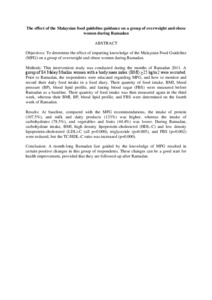Citation
Suriani, Ismail and Shamsuddin, Khadijah and Abdul Latif, Khalib and Abu Saad, Hazizi
(2015)
The effect of the Malaysian food guideline guidance on a group of overweight and obese women during Ramadan.
Saudi Medical Journal, 36 (1).
pp. 40-45.
ISSN 0379-5284; ESSN: 1658-3175
Abstract
Objectives: To determine the effect of imparting knowledge of the Malaysian Food Guideline (MFG) on a group of overweight and obese women during Ramadan.
Methods: This intervention study was conducted during the months of Ramadan 2011. A group of 84 Malay Muslim women with a body mass index (BMI) ≥25 kg/m2 were recruited. Prior to Ramadan, the respondents were educated regarding MFG, and how to monitor and record their daily food intake in a food diary. Their quantity of food intake, BMI, blood pressure (BP), blood lipid profile, and fasting blood sugar (FBS) were measured before Ramadan as a baseline. Their quantity of food intake was then measured again in the third week, whereas their BMI, BP, blood lipid profile, and FBS were determined on the fourth week of Ramadan.
Results: At baseline, compared with the MFG recommendations, the intake of protein (107.5%), and milk and dairy products (133%) was higher, whereas the intake of carbohydrates (78.5%), and vegetables and fruits (44.4%) was lower. During Ramadan, carbohydrate intake, BMI, high density lipoprotein-cholesterol (HDL-C) and low density lipoprotein-cholesterol (LDL)-C (all p=0.000), triglyceride (p=0.005), and FBS (p=0.002) were reduced, but the TC/HDL-C ratio was increased (p=0.000).
Conclusion: A month-long Ramadan fast guided by the knowledge of MFG resulted in certain positive changes in this group of respondents. These changes can be a good start for health improvement, provided that they are followed-up after Ramadan.
Download File
![[img]](http://psasir.upm.edu.my/46571/1.hassmallThumbnailVersion/The%20effect%20of%20the%20Malaysian%20food%20guideline%20guidance%20on%20a%20group%20of%20overweight%20and%20obese%20women%20during%20Ramadan.pdf)  Preview |
|
Text (Abstract)
The effect of the Malaysian food guideline guidance on a group of overweight and obese women during Ramadan.pdf
Download (107kB)
| Preview
|
|
Additional Metadata
Actions (login required)
 |
View Item |

